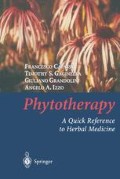Abstract
Digestion takes place in the alimentary canal by means of enzymes secreted mostly by the stomach, pancreas and small intestine. Mechanical movements such as chewing initially break down food before mixing it in the stomach and intestine. Besides enzymes, some glands in the intestine produce a mucus which lubricates and protects the digestive tract, but which can also interact with and reduce the absorption of herbal medicines. Digestion is facilitated by peristaisis, a wave of muscle contractions that begins in the duodenum and spreads towards the colon.
Access this chapter
Tax calculation will be finalised at checkout
Purchases are for personal use only
Preview
Unable to display preview. Download preview PDF.
Further Reading
Afzal M, Al-Hadidi D, Menon M, Pesek J, Dhami M.S. (2001) Ginger: an ethnomedical, chemical and pharmacological review. Drug Metabol Drug Interact 18:159–190
Borrelli F, Izzo A.A. (2000) The plant kingdom as a source of anti-ulcer remedies. Phytother Res 14:581–591
Bortolotti M, Coccia G, Grossi G (2002) Red pepper and functional dyspepsia. New Engl J Med 346 (12):946–948
Bortolotti M, Coccia G, Grossi G (2002) The treatment of functional dyspepsia with red pepper. Aliment Pharmacol Ther 16:1075–1082
Capasso F, Borrelli F, Capasso R, Di Carlo G, Izzo A.A., Pinto L, Mascolo N, Castaldo S, Longo R (1998) Aloe and its therapeutic use. Phytoter Res 12:124–127
Eigner D, Scholz D (1999) Ferula asa-foetida and Curcuma longa in traditional medical treatment and diet in Nepal. J Ethnopharmacol 67:1–6
Ernst E, Pittler M.H. (2000) Efficacy of ginger for nausea and vomiting: a systematic review of randomized clinical trials. Br J Anaesth 84:367–371
Izzo A.A., Gaginella T.S., Mascolo N, Capasso F (1998) Recent findings mode of action of laxatives: the role of platelet activating factor and nitric oxide. Trends Pharmacol Sci 19:403–405
Jailwala J, Imperiale T.F., Kroenke K. (2000) Pharmacological treatment of the irritable bowel syndrome: a systematic review of randomized, controlled trials. Ann Intern med 18:136–147
Langmead L, Rampton D.S. (2001) Review article: herbal treatment in gastrointestinal and liver disease — benefits and dangers. Aliment Pharmacol Ther 15:1239–1252
Langner E, Greifenberg S, Gruenwald J (1998) Ginger: history and use. Adv Ther 15:25–44
Mascolo N, Capasso R, Capasso F (1998) Senna. A safe and effective drug. Phytoter Res 12:S143–S145
Pittler M.H., Ernst E (1998) Peppermint oil for irritable bowel syndrome: a critical review and meta-analysis. Am J Gastroenterol 93:1131–1135
Salier R, Pfister-Hotz G, Iten F, Melzer J, Reichling J (2002) Iberogast. A Modern Phytotherapeutic Combined Herbai Drug for the Treatment of Functional Disorders of the Gastrointestinal Tract (Dyspepsia, Irritable Bowel Syndrome) - from Phytomedicine to ‘Evidence Based Phytotherapy’. A Systematic Review. Forsch Komplementarmed Klass Naturheilkd 9 (Suppl 1):1–20
Rabbani G.H., Teka T, Zaman B, Madjid N, Khatun M, Fuchs G.J. (2001) Clinical studies in persistent diarrhea: dietary management with green banana or pectin in Bangladeshi children. Gastroenterology 121:554–560
Thomson Coon J, Ernst E (2002) Systematic review: herbal medicinal products for non-ulcer dyspepsia. Aliment Pharmacol Ther 16:1689–1699
Tiran D (2002) Nausea and vomiting in pregnancy: safety and efficacy of self-administered complementary therapies. Complement Ther Nurs Midwifery 8:191–196
Van Gorkom B.A., De Vries E.G., Karrenbeld A, Kleibueker J.H. (1999) Review article: anthranoid laxatives and their potential careinogenic effects. Aliment Pharmacol Ther 13:446–452
Wanitschke R, Goerg K.J., Loew D (2003) Differential therapy of constipation--a review. Int J Clin Pharmacol Ther 41:14–21
Author information
Authors and Affiliations
Rights and permissions
Copyright information
© 2003 Springer-Verlag Berlin Heidelberg
About this chapter
Cite this chapter
Capasso, F., Gaginella, T.S., Grandolini, G., Izzo, A.A. (2003). Plants and the Digestive System. In: Phytotherapy. Springer, Berlin, Heidelberg. https://doi.org/10.1007/978-3-642-55528-2_21
Download citation
DOI: https://doi.org/10.1007/978-3-642-55528-2_21
Publisher Name: Springer, Berlin, Heidelberg
Print ISBN: 978-3-540-00052-5
Online ISBN: 978-3-642-55528-2
eBook Packages: Springer Book Archive

